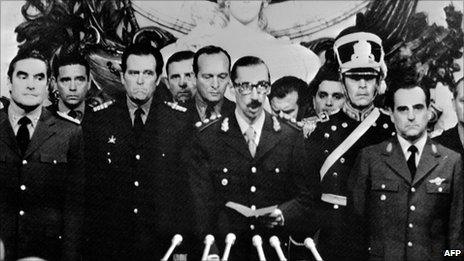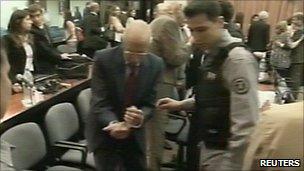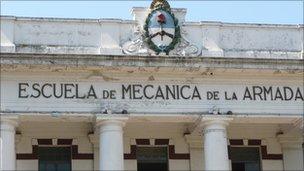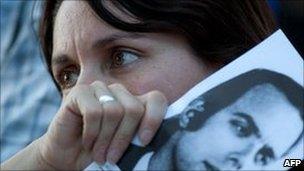Argentina marks coup anniversary amid Dirty War trial
- Published

The 1976 coup heralded an era of repression and human rights abuses
Argentina is marking the day when, 35 years ago, the military took control of the country, heralding seven years of rule that became known as the Dirty War.
24 March is now a national holiday with rallies and other events to celebrate democracy and to remember the estimated 30,000 people who were kidnapped, tortured and killed by the Argentine authorities.
The debate over the legacy of the Dirty War is still raging. The victims' mothers still march every Thursday afternoon in front of the presidential palace in Buenos Aires, demanding answers.
Justice has been slow in coming. But the architects of military rule are now, very publicly, being forced to answer for their actions.

The proceedings in the Buenos Aires court are being televised
Two former military presidents, Jorge Videla and Reynaldo Bignone, along with six of their most loyal supporters, are being tried for what many Argentines feel is the worst atrocity in a long list of human rights abuses committed in the 1970s and 80s.
They are accused of stealing babies from pregnant prisoners and giving them up for adoption to childless couples who supported their government. The mothers were then killed, sometimes thrown from planes into the River Plate.
The trial is dealing with 34 cases.
'War against subversion'
The Grandmothers of the Plaza de Mayo is a human rights group formed by the mothers of the women who gave birth in captivity. They have so far tracked down more than 100 stolen babies, now adults in their late 20s and early 30s.
Their identities were changed, birth certificates were falsified and the adoptive parents rarely revealed the truth to the children they brought up. The Grandmothers of the Plaza de Mayo believe that up to 400 babies were taken in this way.
The prosecution alleges that maternity units were set up in three of the many detention centres run by the authorities as part of a policy planned by the military leaders, including the Navy Mechanical School, or Esma.
Videla is reported to have broken his arm and is not appearing in court for several weeks. The remaining seven were asked if they wanted to make declarations about the charges against them.
One by one they declined.
Instead, their lawyers read out previous declarations they had made, all denying any knowledge of a systematic plan to steal babies.
The phrase that cropped up throughout the declarations was "war against subversion".

The Navy Mechanical School was a notorious torture centre
All the accused say they overthrew President Isabel Peron because she was struggling to deal with great social and economic instability. There were almost daily attacks from both extreme left and right-wing groups.
Instead of stability, the military instigated a reign of terror, mostly against young people. Many victims had no links with the left-wing groups the authorities said they were fighting.
The defendants are all in their 80s. Some of them are helped to their seats by their prison guards. They shuffle into the courtroom wearing handcuffs, which are removed when they enter.
When Judge Maria del Carmen Roqueta asked Bignone about his health, he replied: "Well, I'm 83."
He received a 25-year sentence last year after being found guilty of the kidnapping, torture and murder of 56 people during military rule. Videla already has two life sentences after being convicted of numerous crimes against humanity.
Some of the most notorious leaders have died.
The Grandmothers of the Plaza de Mayo and their legal team have spent 14 years preparing this case. Nearly 400 witnesses are expected to be heard and the case could take anything from eight months to a year.
Never forgotten
Some of the top commanders were prosecuted in the early days of the first civilian government. But following decisions by the first two civilian presidents to grant the military amnesties and pardons, no further trials took place.

Argentina is still coming to terms with its past
It was only after Nestor Kirchner became president in 2003 that the trials were resumed.
The court, in an unusual move, allowed state TV channels to televise proceedings, ensuring that a wide audience could follow the testimonies.
24 March is now a date firmly enshrined in the Argentine calendar. It serves two main purposes: that the victims not be forgotten and that the experience is never repeated.
Leonardo Fossati is one of those taken from his mother and given up for adoption. He recovered his true identity in 2005.
"This trial is necessary," he said. "To set things straight."
The trial of the eight men accused of stealing babies is slow and tortuous.
But only when the true horror of what went on in Argentina between 1976 and 1983 is revealed in all its gruesome detail will the country know what it really went through and be able to continue healing its wounds.
- Published5 March 2011
- Published28 February 2011
- Published22 December 2010
- Published7 June 2010